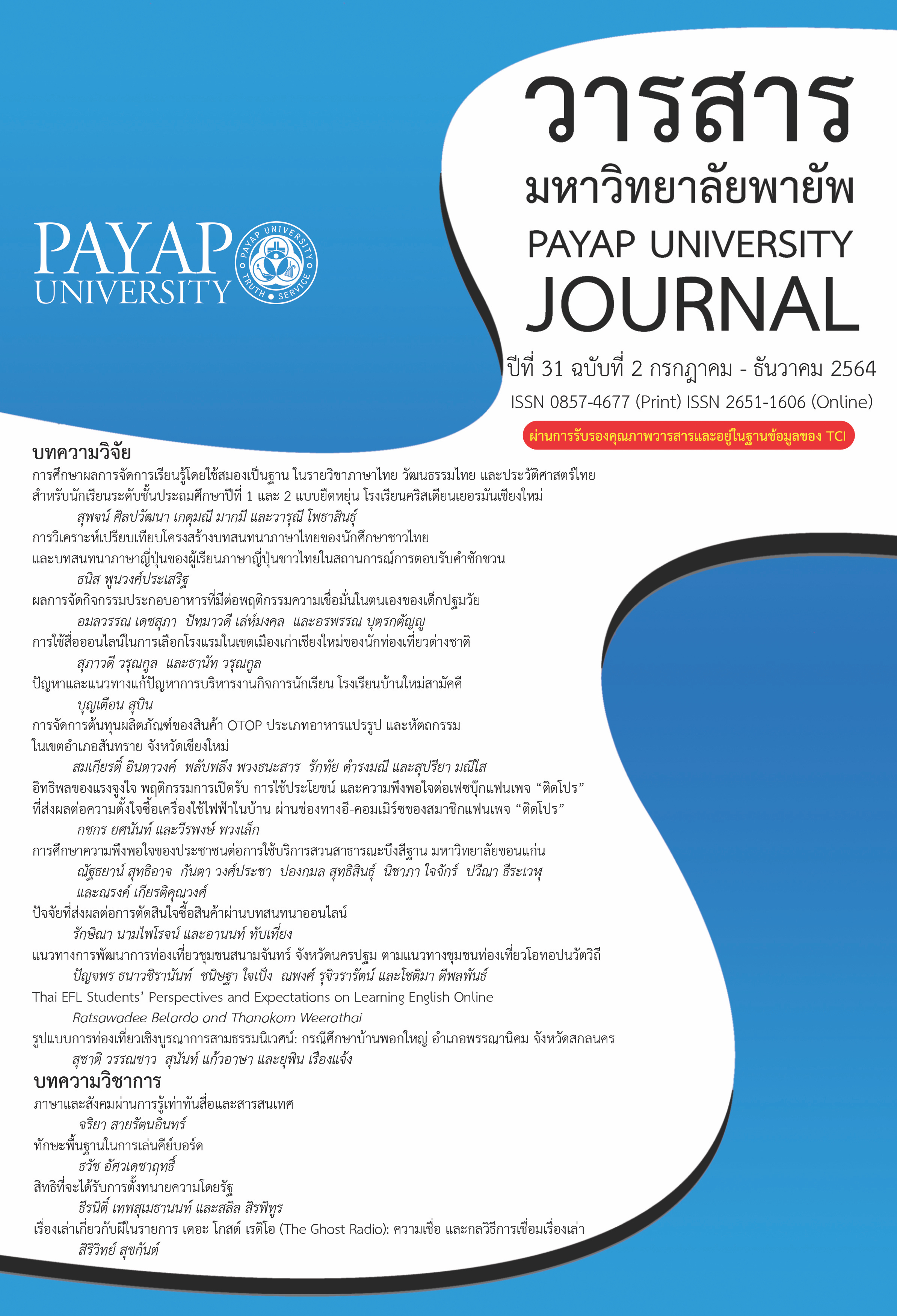สิทธิที่จะได้รับการตั้งทนายความโดยรัฐ
Main Article Content
บทคัดย่อ
ประมวลกฎหมายวิธีพิจารณาความอาญาได้บัญญัติรับรองสิทธิที่จะได้รับการตั้งทนายความให้โดยรัฐในชั้นสอบสวน ในชั้นไต่สวนมูลฟ้องและในชั้นพิจารณา เมื่อพิจารณาบทบัญญัติตามประมวลกฎหมายวิธีพิจารณาความอาญาที่เกี่ยวกับสิทธิที่จะได้รับการตั้งทนายความให้โดยรัฐตั้งแต่ประมวลกฎหมายวิธีพิจารณาความอาญาเริ่มมีผลใช้บังคับเมื่อวันที่ 1 ตุลาคม พ.ศ. 2478 และที่แก้ไขเพิ่มเติมจนถึงบทบัญญัติที่ใช้ในปัจจุบัน จะพบว่ามีพัฒนาการที่ให้ความคุ้มครองผู้ถูกกล่าวหาที่จะได้รับการตั้งทนายความให้โดยรัฐเพิ่มมากขึ้น เมื่อพิจารณาเปรียบเทียบสิทธิที่จะได้รับการตั้งทนายความโดยรัฐตามประมวลกฎหมายวิธีพิจารณาความอาญากับมาตรฐานสากลพบว่า มีความสอดคล้องกับปฏิญญาสากลว่าด้วยสิทธิมนุษยชน และสอดคล้องกับกติการะหว่างประเทศว่าด้วยสิทธิพลเมืองและสิทธิทางการเมือง อย่างไรก็ตาม เมื่อเปรียบเทียบกับกฎหมายรวมถึงคำวินิจฉัยของศาลสูงสุดของประเทศสหรัฐอเมริกาและกฎหมายของประเทศอังกฤษ พบว่าบทบัญญัติตามประมวลกฎหมายวิธีพิจารณาความอาญาไม่ได้บัญญัติในเรื่องสิทธิในการที่จะได้รับการช่วยเหลืออย่างมีประสิทธิภาพจากทนายความเพื่อให้ผู้ถูกกล่าวหาได้รับการช่วยเหลือจากทนายความอย่างมีประสิทธิภาพ จึงเห็นควรแก้ไขบทบัญญัติของกฎหมายโดยกำหนดคุณสมบัติทนายความที่ได้รับการตั้งให้โดยรัฐหรืออาจจะพิจารณารูปแบบของประเทศอังกฤษที่ให้มี Criminal Defence Service ในปี ค.ศ. 1999 ซึ่งสามารถจ้างทนายความในสำนักงานทนายความเอกชนมาให้ความช่วยเหลือแก่ผู้ต้องหาหรือจำเลยมาบัญญัติไว้ในกฎหมาย
Article Details
เอกสารอ้างอิง
กฎหมายลักษณะอาญา ร.ศ. 127 (ร.ศ. 127). ราชกิจจานุเบกษา, 25(ตอนพิเศษ), 206-287. สืบค้นเมื่อ 29 กรกฎาคม 2564. http://www.ratchakitcha.soc.go.th/DATA/PDF/2451/009 /206.PDF
กรมคุ้มครองสิทธิและเสรีภาพ. (2557). สาระสำคัญกติการะหว่างประเทศว่าด้วยสิทธิพลเมืองและสิทธิทางการเมือง (International Covenant on Civil and Political Rights : ICCPR), สืบค้นเมื่อ 28 กรกฎาคม 2564. http://www.rlpd.go.th/rlpdnew/images/rlpd_1/International _HR/2557/tran_ICCPR-2.pdf
กระทรวงการต่างประเทศ. (2551). ปฏิญญาสากลว่าด้วยสิทธิมนุษยชน = Universal Declaration of Human Rights, สืบค้นเมื่อ 28 กรกฎาคม 2564. https://www.law.cmu.ac.th/law2011/ journal/e1378954318.pdf.
เกียรติขจร วัจนะสวัสดิ์. (2553). คำอธิบายหลักกฎหมายวิธีพิจารณาความอาญาว่าด้วยการดำเนินคดีในขั้นตอนก่อนการพิจารณา (พิมพ์ครั้งที่ 7 (แก้ไขเพิ่มเติม)). กรุงเทพฯ: พลสยามพริ้นติ้ง.
คณะกรรมการสิทธิมนุษยชนแห่งชาติ. (2554). หลักกฎหมายระหว่างประเทศทั่วไปเกี่ยวกับสนธิสัญญาด้านสิทธิมนุษยชน กติการะหว่างประเทศว่าด้วยสิทธิพลเมืองและสิทธิทางการเมือง UN International Covenant on Civil and Political Rights (ICCPR). กรุงเทพฯ: ผู้แต่ง.
คณิต ณ นคร. (2555). กฎหมายวิธีพิจารณาความอาญา (พิมพ์ครั้งที่ 8). กรุงเทพฯ: วิญญูชน.
จรัญ โฆษณานันท์. (2559). สิทธิมนุษยชนไร้พรมแดน (พิมพ์ครั้งที่ 3). กรุงเทพฯ: นิติธรรม.
ณรงค์ ใจหาญ. (2563). หลักกฎหมายวิธีพิจารณาความอาญา เล่ม 2 (พิมพ์ครั้งที่ 6). กรุงเทพฯ: วิญญูชน.
ณรงค์ ใจหาญ และคนอื่น ๆ. (2540). รายงานการศึกษาวิจัยฉบับสมบูรณ์ เรื่องสิทธิผู้ต้องหา จำเลยและผู้ต้องโทษในคดีอาญา. กรุงเทพฯ: ม.ป.พ.
ธานิศ เกศวพิทักษ์. (2564). คำอธิบายประมวลกฎหมายวิธีพิจารณาความอาญา เล่ม 2 ภาค 3 - 4 (พิมพ์ครั้งที่ 15). กรุงเทพฯ: สำนักอบรมศึกษากฎหมายแห่งเนติบัณฑิตยสภา.
ธีรนิติ์ เทพสุเมธานนท์. (2563). กฎหมายวิธีพิจารณาความอาญา 2 (พิมพ์ครั้งที่ 3). กรุงเทพฯ: มหาวิทยาลัยรามคำแหง.
ปกป้อง ศรีสนิท. (2563). สิทธิมนุษยชนในกระบวนการยุติธรรมทางอาญา. กรุงเทพฯ: วิญญูชน.
พระราชบัญญัติแก้ไขเพิ่มเติมประมวลกฎหมายวิธีพิจารณาความอาญา (ฉบับที่ 15) พ.ศ. 2527. (2527). ราชกิจจานุเบกษา, 101(ตอน 127), 1-6. สืบค้นเมื่อ 28 กรกฎาคม 2564. http://www.
ratchakitcha.soc.go.th/ DATA/PDF/2527/A/127/1.PDF
พระราชบัญญัติแก้ไขเพิ่มเติมประมวลกฎหมายวิธีพิจารณาความอาญา (ฉบับที่ 17) พ.ศ. 2532. (2532). ราชกิจจานุเบกษา, 106(ตอน 149), 4-11. สืบค้นเมื่อ 2 สิงหาคม 2564. http://www. ratchakitcha.soc.go.th/DATA/PDF/2532/A/149/4.PDF
พระราชบัญญัติแก้ไขเพิ่มเติมประมวลกฎหมายวิธีพิจารณาความอาญา (ฉบับที่ 19) พ.ศ. 2539. (2539). ราชกิจจานุเบกษา, 113(ตอนที่ 16 ก), 6-9. สืบค้นเมื่อ 2 สิงหาคม 2564. http://www. atchakitcha.soc.go.th/DATA/PDF/2539/A/061/6.PDF
พระราชบัญญัติแก้ไขเพิ่มเติมประมวลกฎหมายวิธีพิจารณาความอาญา (ฉบับที่ 20) พ.ศ. 2542. (2542). ราชกิจจานุเบกษา, 116(ตอนที่ 81 ก), 30-35. สืบค้นเมื่อ 2 สิงหาคม 2564. http://www. ratchakitcha.soc.go.th/DATA/PDF/2542/A/081/30.PDF
พระราชบัญญัติให้ใช้ประมวลกฎหมายวิธีพิจารณาความอาญา พุทธศักราช 2477. (2478). ราชกิจจานุเบกษา, 52(ตอนพิเศษ), 598-721. สืบค้นเมื่อ 25 กรกฎาคม 2564. http://www. ratchakitcha.soc.go.th/DATA/PDF/2478/A/598.PDF
สำนักงานอัยการสูงสุด. (2561). หนังสือสำนักงานอัยการสูงสุดที่ อส 0007(ปผ)/ว 355 ลงวันที่ 14 พฤศจิกายน พ.ศ. 2561) ที่ อส 0007(ปผ)/ว 355 ลงวันที่ 14 พฤศจิกายน พ.ศ. 2561 เรื่อง การสอบถามผู้ต้องหากรณีมีทนายความหรือไม่ ตามประมวลกฎหมายวิธีพิจารณาความอาญา มาตรา 134/1. สืบค้นเมื่อ 25 กรกฎาคม 2564. http://www.ogad.ago.go.th/dagsu/images/stories/v61/v355.pdf
สุรศักดิ์ ลิขสิทธิ์วัฒนกุล. (2548). คำอธิบายพระราชบัญญัติแก้ไขเพิ่มเติมประมวลกฎหมายวิธีพิจารณาความอาญา (ฉบับที่ 22) พ.ศ. 2547. กรุงเทพฯ: วิญญูชน.
สุรศักดิ์ ลิขสิทธิ์วัฒนกุล. (2562). ประมวลกฎหมายวิธีพิจารณาความอาญา (ฉบับอ้างอิง) (พิมพ์ครั้งที่ 19). กรุงเทพฯ: วิญญูชน.
The Library of Congress. (1932). Right to counsel: Historical background, Retrieved August 18, 2021. from http://constitution.congress.gov


